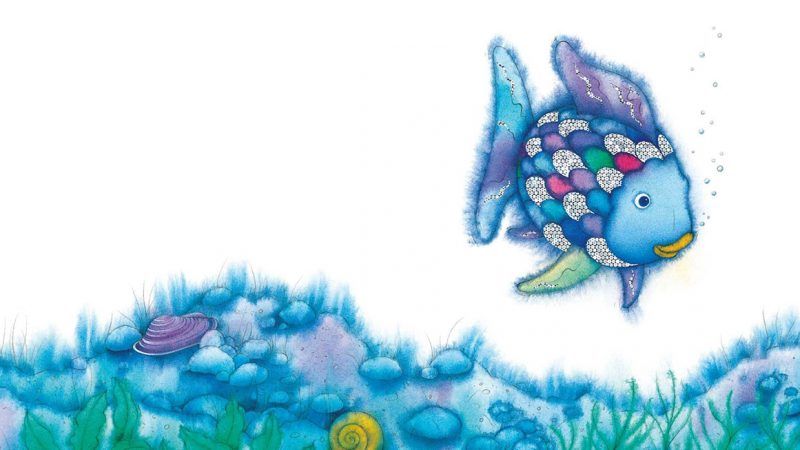Don't Be Like the Rainbow Fish
Like so many of the best socialist products, Marcus Pfister's The Rainbow Fish has been a runaway capitalist success

Like so many of the best socialist products, Marcus Pfister's The Rainbow Fish has been a runaway capitalist success. The children's classic, in which the most brightly colored fish in the ocean finds happiness only after handing over all but one of his glittering scales under duress to the gray grumps around him, has sold since its 1992 debut more than 30 million copies worldwide.
Whereas Rainbow Fish achieves transcendence through literally becoming colorless, the exact opposite was the case for The Rainbow Fish. Using an expensive and novel combination of holographic foil stamping and watercolor, the Swiss-born Pfister and his publisher, NorthSouth Books, produced a striking visual package that proved irresistible.
"The effect of the stamping was so nice that all the bookshops here in Switzerland put it in the windows," Pfister recalled in a 2013 interview with Publisher's Weekly. "We decided that I'd get only 50 percent of my usual royalties for the book, and only that way was it possible to make it work." Looks like a win-win.
Except for some of us parents, that is. Like countless toddler wranglers, I ended up with a copy of The Rainbow Fish around the house—gift, hand-me-down, who knows?—when my firstborn was getting out of diapers, and it took me all of one reading to understand why the former conservative radio host Neal Boortz 12 years ago called it not just "insidious" but "one of the biggest pieces of trash children's books ever published." (Boortz's anti-Rainbow animus became so legendary that it sparked a response publication of sorts, called Starboortz Fish, in which a dull starfish is counseled that in order to truly shine he must earn the honor through industriously using what competitive advantages he already has.)
Libertarians won't last long in this world taking easy umbrage at the statist culture around them. And as the unwilling recipient of more political children's books than my mind has been able to successfully scrub, I can testify that kiddie propaganda in the other direction can be gruesome, too. But Pfister's blockbuster—which was spun off into an animated TV series, plus several sequels—is toxic enough that I took the rare step of expelling it from my home.
Why? Start with the protagonist. He starts as "the most beautiful fish in the entire ocean," but he refuses to talk or play with the other guppies, preferring instead to "glide past, proud and silent, letting his scales shimmer." I mean, we've all known arrogant people, but don't they usually try to leverage their inherited gifts into some kind of (advantageous-to-them) social interaction?
Instead, he whines about not having any friends. A quest ensues to meet the wise and scary octopus, who advises: "Give a glittering scale to each of the other fish. You will no longer be the most beautiful fish in the sea, but you will discover how to be happy."
This, it turns out, is a counsel to pay ransom—because on previous pages we learned that his fellow fish shun Rainbow not because he won't play with them but because he refused a request from one of them to "give me one of your shiny scales. They are so wonderful, and you have so many." Sure, the colorful fella's a jerk, but he only gets truly ostracized because he won't hand over his body parts on demand, in the name of equality.
After Rainbow Fish dutifully relinquishes a shiny scale to a grateful swimmer, the other fish mob him to insist on their fair share. "His most prized possessions had been given away, yet he was very happy," Pfister concludes after the giveaway. Only then do the other fish invite him back to play.
There is exactly one good moral to be gleaned from these shimmery blue pages: Don't be imperious about your inherited advantages. The rest is the kind of thuggishly naive utopianism that not even John Lennon believed anymore a few months after releasing "Imagine."
But in these times of democratic socialism and ideological abstractions untethered to real-world habits, The Rainbow Fish may have more resonance than ever. It takes genuine artistic and marketing talent, plus the almost magical trade routes made possible by international capitalism (the book has been translated into more than 50 languages), to sell redistribution fantasia to so many millions in exchange for their own hard-earned money. Physical and sociological intimidation was, thankfully, not enough. Kids may as well learn now: Incoherent insincerity can make you rich, if you work hard enough.
(Addendum: Our friends over at Challenger School have their own interpretation of the book, and how that relates to their educational mission. Well worth the read!)
